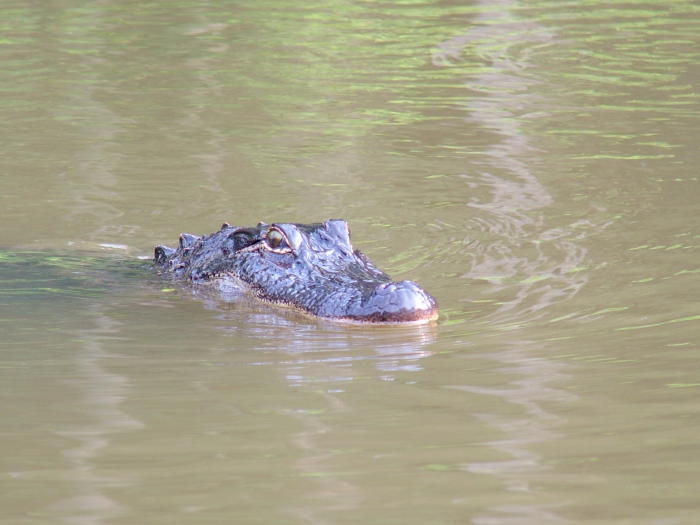Gator Zen

True Story. Visiting Florida last week, in a canoe on the Loxahatchee river, my wife at the front, me in back paddling, wind comes up suddenly and blows us sideways toward the muddy bank ... right into the backside of a sleeping 4-foot alligator. (Now, it's not so easy to hit a gator, even in the Everglades with lots scattered about. Just, I suppose, where chance brought all of us) Gator is none too pleased, you know. Bangs the little boat with his tail a couple of times, lets out a mean roar, shows some teeth, scampers away into the tall grass.
Shaken, but still afloat, we steer the canoe back to the center of the channel and proceed with our journey ... rather glad he was not a 5-foot gator, rather glad we hit the backside and not the front.
Suddenly, whole meaning of this Zen thing is clear. (For those not picking up the literary symbolism, gator represents the problems of life, river is life, the wind is fate, a balanced canoe - equanimity of body and mind, a disturbed vessel a disturbed mind, the paddling is just moving forward. My wife represents my wife.) Here goes:
In the canoe of life, you, your wife, the canoe, the paddle, the river, the alligator, the grass, the mosquitoes and the whole damn Everglades are just One Great Swamp. Accept all alligators, and seek to embrace their existence, for they -- and you too -- are the life of the river. But, at the moment your canoe crashes into the alligator's backside, try explaining that to the alligator ... or to yourself (or to your wife in the front of the boat, also baring her teeth). It is okay to paddle furiously to get away, if that is possible.
(If not possible, practice famous Zen parable about plucking a strawberry when chased over cliff by hungry tiger)
In the canoe of life, our Zen practice is allowing the vessel's natural balance, heading down the twisty channel as best we can. Sometimes we paddle badly, sometimes the wind comes up despite our hard paddling and blows us into gators. No matter. Every time you crash into a gator, merely allow your canoe to settle, find the middle of the channel.
(If unable to find the channel, just be where you are)
In the canoe of life, sometimes you foolishly stand up and rock the boat, sometimes the boat is rocked by forces beyond your control. Sometimes the whole thing tips and you tumble into alligator infested waters. Every time you stand up and rock the boat, or the boat is rocked by circumstance ... JUST SIT ... The best balance is there, in just sitting. If you've fallen into the water, seek to get back into your boat.
(If unable to return to boat, appreciate the wetness of the river)
In the canoe of life, you may not know who (if any "who") made the canoe, the river, you, your wife, the gator, etc. etc., the Whole Darn Swamp. But, here you find yourself, in life's canoe, with a paddle, heading down that river. River runs before you, seems like you came from behind. You do not know why (if any "why"). What to do?
.... Just paddle paddle, sometimes drift drift, try to stay in the middle of the channel.
Oh, and where possible, avoid gators.
.
